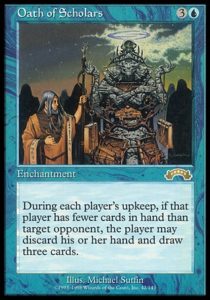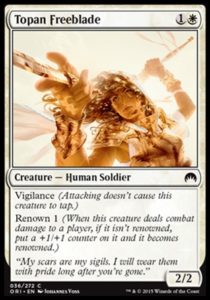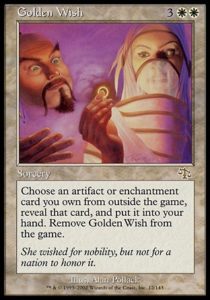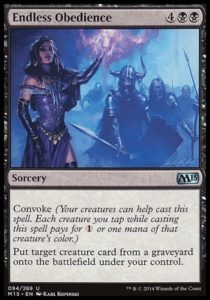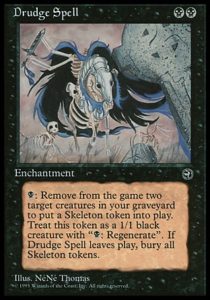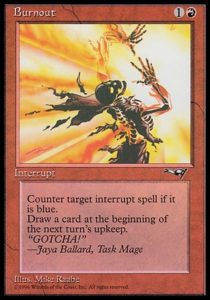Rather than discuss the prerelease in depth this week, as everyone will already be doing, I’m taking the opportunity to kill two birds with one stone. I get to share with you some of the neat discussion happening at the NYU Game Center. Also… I get to write my homework in my own words before putting it in academic-ese. If you’d prefer to just see my prerelease pool, it’s at the bottom of this article (but it’s not the focus of this article).
I’m writing a paper for my Game Studies class on whether playing games professionally means that one ceases to be “playing a game.” In other words… are eSports, competitive Magic, and the like games or jobs? (And could something be a job and a game, or must it be either one or the other?) This question warrants consideration, particularly among competitive Magic players looking to step their game up to the big leagues and players looking to be competitive within their local communities.
One of the essential qualities of a game is that it is voluntary. Sure, someone can touch a bystander in Tag or cajole someone into being their draft’s eighth, but everyone has the right to refuse to play. Even if someone says, “You lost the game,” (sorry, it’s a good example) you aren’t forced into caring about The Game or forcing other people to play. Playing is always player’s choice.
Furthermore, the volition of games is distinct from the volition of work. You can choose not to go to work, but doing so incurs a penalty: you have a lighter paycheck, get chewed out by your boss, or get fired. If you decide to skip Friday Night Magic, you miss out on playing with friends, the opportunity to improve, and fun, but there is no comparable penalty. I’m not certain precisely how to distinguish the volition of games from the volition of work, but money seems to be a central factor.
As most of us know, Magic has plenty of financial incentives. There’s the thrill of cracking packs and hoping to open a Zendikar Expedition or Jace, Vryn’s Prodigy. Gambling is itself a game, and one that can involve copious amounts of money. However, I’d like to focus less on gambling with packs and more on tournament prizes and how they change players’ incentives. It’s one thing to enjoy winning packs at your LGS or cashing at a GP, but what happens when you need to succeed for the sake of money? Consider the following situations:
- The professional player who needs to fly around the world and spike a Grand Prix in order to lock up Gold; if they don’t get Gold, they won’t be able to afford playing Magic next year.
- The tournament grinder who needs 1,000 more Planeswalker Points and spends every weekend driving to PPTQs; if they don’t get that second bye, they’ve ‘wasted’ that year of Magic and will have to spend far more money next year to acquire their byes.
- The unemployed LGS competitor who needs to 3-1 a Standard tournament to get enough store credit to play next week; if they don’t do well enough, they have to sell their deck to keep playing.
All of these players have strong incentives to play Magic, however their incentives relate to money, not the game. Furthermore, there is a sense of necessity—their reason for playing isn’t enjoyment or a desire to play, they play because they need what Magic can provide them. This necessity makes Magic less voluntary and more like a job—participation is mandatory and poor performance or nonparticipation incurs a penalty. Perhaps that’s where the problem lies: when Magic becomes necessary, it becomes more like work and less like playing a game.
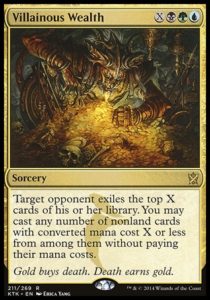
Does money even matter in this discussion? If necessity is what threatens to remove volition from the game, does it matter if players don’t need the money they acquire through Magic? Magic is an expensive game; you need to have at least a somewhat stable income in order to play at all (at least, to play competitively). Much of the money that’s won in Magic (via packs, store credit, and tournament prizes) is immediately reinvested in the game, serving as a discount to further play, rather than the end goal of playing. Most Magic players spend money to play Magic, but very few play Magic because they need money.
Even when money is a goal, one can still be a player. Speculation and trading are games in and of themselves, but I’d argue that their ends are more playful than work-like; people are enjoying the amassing of virtual wealth, rather than needing the value they generate in order to pay their bills and buy groceries. After all, someone who turns their collection into money ceases to play, since in so doing they lose what they play with. It’s only when the speculator needs the money that they seem to be working more than playing. Granted, there’s a name for someone who constantly turns their cards into cash, needing to make money on every exchange in order to pay rent: a card vendor… which I would certainly call a job.
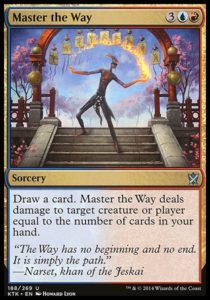
I was ready to leave the professional player alone—after all, I believe that there are pros who deeply enjoy playing the game of Magic at the highest possible level (hell, how many of us aren’t at least a little Spikey and love showing that we’re damned good at something?). However, there are pros who do need Magic to pay their rent. What about the pros who ‘don’t have a day job,’ or really, the folks for whom Magic is their primary source of income? They may still enjoy the game, but they need to play. It’s their job.
When Magic becomes a job, does it cease to be a game for the player? As said before, playing a game is voluntary, work is not. While it may be self-evident that Magic is a game, not everyone involved in its creation and distribution could be said to be playing it. Are a member of Creative, a GP’s head judge, and the employee at your LGS playing, or are they just working? Do the pro and vendor, for whom Magic is their source of income, for whom Magic is not voluntary, nevertheless still play? Can Magic be their job, but their job is playing the game? Do work and play have to mutually exclusive? And if they can coexist, can jobs qualify as games? If we can work-ify games, then surely we can game-ify work.
I pose these questions not because I have the answers (for my homework, I ideally will, but it’ll be in the context of articles, rather than merely the thoughts of a rambling Magic player), but because I’m curious what you think. I am, after all, not a pro player, and it isn’t my place to tell pro players, “No, you are working at a game, but you aren’t playing it.” Frankly, I’m unsure that I really believe that playing a game professionally precludes play. And besides, even if I did, what gives me the right to decree that I’ve logically deduced the absence of play in someone else’s game and livelihood?
Considering the work-play balance is likely most relevant to those Spikes of us who aspire to game with the greats. How far are we willing to go for greatness (at any cost)? How much are we willing to let Magic resemble work? When do we stop going to events because we want to and start going to events because we need what they will provide us? Will we stop and consider whether we’re still playing game in a healthy manner, or will we burn ourselves out and take a vacation from the game? Too often do players not stop and reevaluate why they play before discovering that they’ve long since lost the fun.
At the end of the day, you need to ask yourself: why do I play this game? What do I want to get out of it? Am I getting it? Honestly, that’s a more important question than whether you’re playing a game in the first place (thought that’s an interesting question, too).
And as always, thanks for reading.
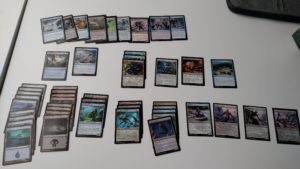
P.S. Here’s my prerelease pool. Everything about it was underwhelming, except resolving Ulamog. That part was awesome.
—Zachary Barash
Zachary Barash has been playing Magic on and off since 1994. He loves Limited and drafts every available format (including several that aren’t entirely meant to be drafted). He’s a proud Cube owner, improviser, and game designer. He has an obsession with Indian food that borders on being unhealthy.

